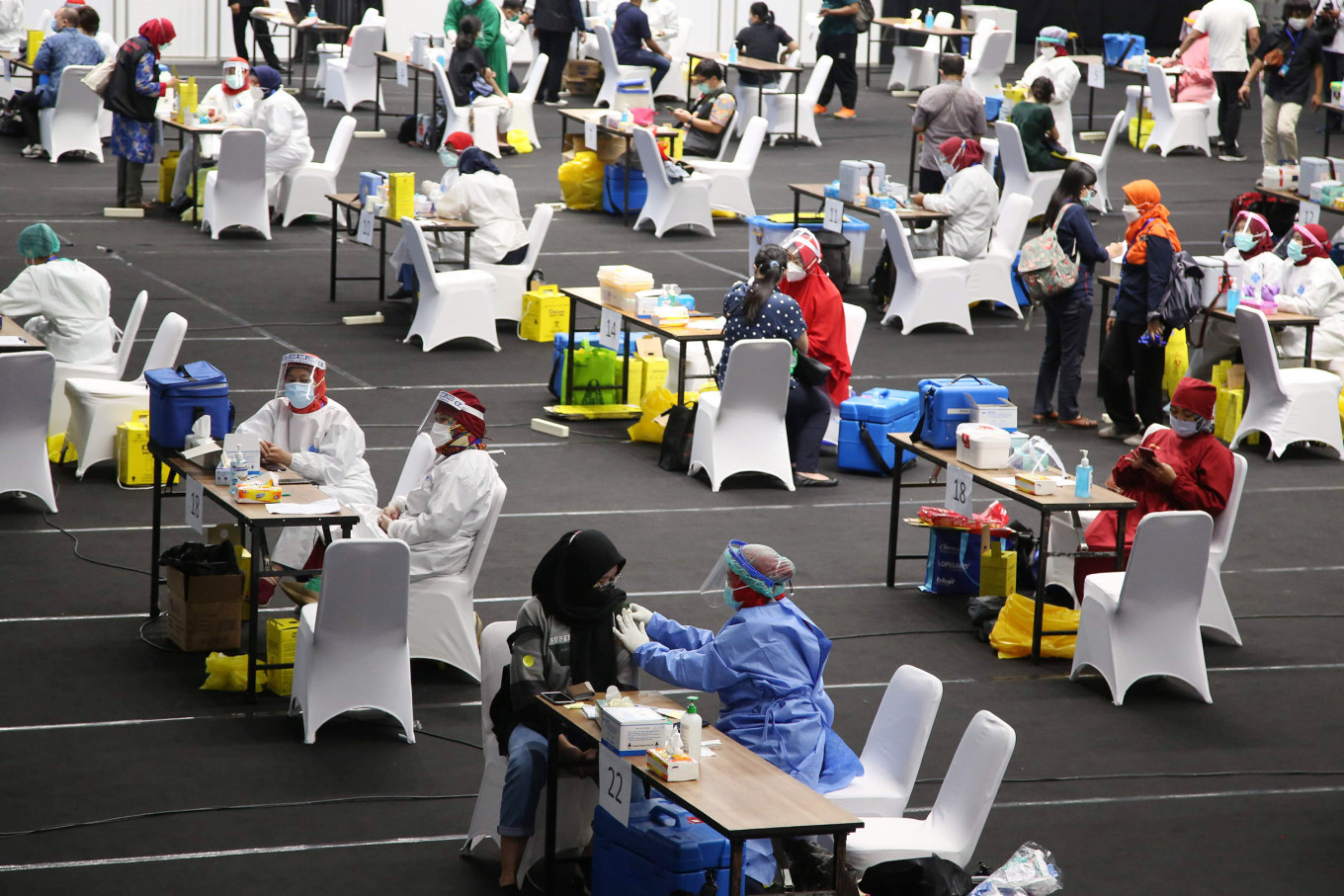People with mental illness in Greater Jakarta can now get COVID-19 shots
Change Size

T
he government has started COVID-19 vaccination for people with mental illness residing in Jakarta's satellite cities earlier than planned.
Recognizing mentally ill people as a vulnerable population together with disabled people, the government decided to include them in the second phase of the vaccination program, which is ongoing in most parts of Greater Jakarta targeting the elderly and essential workers.
People with mental disorders initially could only get the jab in the coming third phase of the vaccination program, along with other target groups -- people living in densely populated areas and members of marginalized groups. Jakarta, meanwhile, started its third phase in mid-May, while continuing to inoculate the remainder of the elderly and essential workers.
The inclusion of mentally ill and disabled people serves as a transition from the second phase to the third phase of the vaccination drive in Greater Jakarta.
“The government expanded the target population for the second phase because we realize people with mental health disorders and disabled people are vulnerable,” Health Ministry director for infectious diseases Siti Nadia Tarmizi told The Jakarta Post on Friday.
Read also: Vaccination of ‘vulnerable groups’ begins amid expert skepticism
The government will focus on inpatients and outpatients at psychiatric hospitals in the vaccination extension, but people with mental health disorders, along with disabled people, will also be able to get the vaccine at any health facility and vaccination center, regardless of the address on their ID card.
Health Minister Budi Gunadi Sadikin has promised to give serious attention to patients with mental illness after considering that their inability to communicate their comorbidities prior to receiving the vaccine could hamper vaccination efforts.
COVID-19 vaccination generally requires recipients to fill in a screening form because people with uncontrolled comorbidities, hypertension and fever are not eligible for the vaccine without their treating doctor’s recommendation.
Budi made the statement early last week after inspecting the vaccination of the first 34 of 100 targeted patients at the Marzoeki Mahdi psychiatric referral hospital in Bogor, one of Jakarta's satellite cities under West Java jurisdiction.
Budi said, as reported by kompas.com, that the program in Bogor had set “a good example” for other psychiatric hospitals.
The Bogor city administration became the first in Indonesia to vaccinate people with mental illness, with the Bogor Health Agency targeting about 1,000 members of this target group to be gradually vaccinated.
Prioritizing people with mental disorders is an attempt to implement President Joko “Jokowi” Widodo's instruction to speed up the coronavirus vaccination drive in the capital and its surrounding areas. Jakarta remains Indonesia's COVID-19 epicenter, with almost 1,200 daily cases and over 11,800 active cases recorded on Monday.
Read also: Mental health services disrupted in 93% of countries during COVID-19 pandemic: WHO
Marzoeki Mahdi director Fidiansjah revealed the requirements for psychiatric inpatients and outpatients to receive the COVID-19 vaccine: They have to be declared stable and they also need to have informed consent from a family member, which is necessary because some have impaired consciousness or lack the capacity to provide consent themselves.
The Health Ministry also said the Social Affairs Ministry and the Home Ministry’s population and civil registration agency would work together to register homeless people with mental health disorders with no ID cards for enrollment in the vaccination program.
However, concerns about their records regarding comorbidities remain, with Eijkman Institute for Molecular Biology chairman Amin Soebandrio calling on the government to find a solution for them because they have no guardians to fill in their history of comorbidities and informed consent.
“The government needs to start considering how to process homeless people with mental disabilities that have no record of their comorbidities,” Amin told the Post.
[RA:Volunteers travel 80 km to give COVID-19 aid to shackled mental health patients in NTT::/news/2020/05/02/volunteers-travel-80-km-to-give-covid-19-aid-to-shackled-mental-health-patients-in-ntt.html]
For the time being, COVID-19 vaccination programs for homeless people with mental disabilities are conducted by the Social Affairs Ministry’s shelters, or panti sosial.
“Our priority is getting them vaccinated because it's their right to receive one as soon as possible. If they are unable to specify their comorbidities, medics would perform a general check up [...] to make sure they are stable and do not have hypertension and fever,” Siti said.
Her office estimated roughly 337,000 people with mental health disorders nationwide.
The third phase of the vaccination program begins gradually this month in four big cities -- Surabaya, Bandung, Yogyakarta and Medan -- following the rollout in Jakarta that serves as a pilot project for other regions. People with mental illness in these cities are also a target group.









